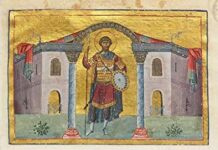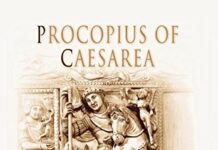
Ebook Info
- Published: 2004
- Number of pages: 320 pages
- Format: PDF
- File Size: 15.53 MB
- Authors: Anthony Kaldellis
Description
Justinian governed the Roman empire for more than thirty-eight years, and the events of his reign were recorded by Procopius of Caesarea, secretary of the general Belisarius. Yet, significantly, Procopius composed a history, a panegyric, as well as a satire of his own times. Anthony Kaldellis here offers a new interpretation of these writings of Procopius, situating him as a major source for the sixth century and one of the great historians of antiquity and Byzantium.Breaking from the scholarly tradition that views classicism as an affected imitation that distorted history, Kaldellis argues that Procopius was a careful student of the classics who displayed remarkable literary skill in adapting his models to the purposes of his own narratives. Classicism was a matter of structure and meaning, not just vocabulary. Through allusions Procopius revealed truths that could not be spoken openly; through anecdotes he exposed the broad themes that governed the history of his age.Elucidating the political thought of Procopius in light of classical historiography and political theory, Kaldellis argues that he owed little to Christianity, finding instead that he rejected the belief in providence and asserted the supremacy of chance. By deliberately alluding to Plato’s discussions of tyranny, Procopius developed an artful strategy of intertextuality that enabled him to comment on contemporary individuals and events. Kaldellis also uncovers links between Procopius and the philosophical dissidents of the reign of Justinian. This dimension of his writing implies that his work is worthy of esteem not only for the accuracy of its reporting but also for its cultural polemic, political dissidence, and philosophical sophistication.Procopius of Caesarea has wide implications for the way we should read ancient historians. Its conclusions also suggest that the world of Justinian was far from monolithically Christian. Major writers of that time believed that classical texts were still the best guides for understanding history, even in the rapidly changing world of late antiquity.
User’s Reviews
Editorial Reviews: Review Fresh, bold, independent, provocative, and, accordingly, controversial. ― Journal of Near Eastern HistoryA masterly corrective, which establishes Procopius as a first-rate historian. . . . No scholar of late antique and Byzantine literature can afford to leave it unread. ― Mouseion Book Description A major new study of the last great historian of classical antiquity. From the Publisher Anthony Kaldellis teaches Greek and Latin at The Ohio State University. He has translated Genesios’s On the Reigns of the Emperors and has written books on Psellos’s Chronographia and (in Greek) on the Roman and Byzantine history of Lesbos. About the Author Anthony Kaldellis teaches Greek and Latin at The Ohio State University. He has translated Genesios’s On the Reigns of the Emperors and has written books on Psellos’s Chronographia and (in Greek) on the Roman and Byzantine history of Lesbos. Read more
Reviews from Amazon users which were colected at the time this book was published on the website:
⭐Kaldellis has revived the interest in Procopius which of later years has turned into a bit of a hate-fest. His ability to reinvigorate a classical work that has been around since the 5th Century AD with new and meaningful insight exposes the need for a new way of thinking about the worlds of antiquity, and moving away from the stagnating classical history of today’s ancient historians back to the inventive and philosophical views of, dare I say it, the antiquarians of old. Kaldellis takes an opposing view of his contemporaries who sneer at the “classicism” of Procopius, writing in Attic Greek at a time when Byzantium was waxing as Rome and classical Greece waned as the dark clouds of northern barbarians dimmed the bright light of the ancient world; and within two hundred years, Islam would set the rest of the world on fire. How did the Dark Ages come about? How did classical civilization falter? How did the technical, architectural and industrious world of the Romans finally give way to the cruel and unenlightened world of the early Middle Ages? How did the West step out of the light for a thousand years? Could it happen again? These are the threads that Procopius has woven into his works and modern historians need to re-weave into a cautionary tale of how a modern prosperous society, compounded by a litany of inept decisions and poor foresight, drove itself into extinction.
⭐Kaldellis’s Procopius of Caesarea is the most up-to-date work on Procopius and is a must for anyone interested in the period or author. It is also a brilliantly argued book, fascinating in its insights and style, even if these are sometimes perhaps pushed a little too far.Before Kaldellis, orthodoxy on Procopius rested with Averil Cameron, who saw Procopius’ classicism as literary affectation masking the voice of a sixth-century Christian writer. Kaldellis argues Procopius’ classicising voice is genuine, and therefore a guide to his ultimate message. His achievement is to have used the works’ very genre, especially the Wars, to show how a thorough decoding may be performed. Thus while Cameron writes that Procopius had little political vision and that the Wars were only burdened by Procopius’ need to imitate classical historians, Kaldellis argues that, on the contrary, one must go beyond skimming and look for the information this style itself makes available.Though the Wars apparently had wide appeal, the classically educated reader would have picked up Procopius’ borrowings from, and allusions to, classical Greek poets and historians. This made possible the communication of a second, potentially subversive meaning behind the text. Kaldellis found, for example, that the text of Justinian’s decision to embark on the Vandal wars, in Wars III, is exactly modelled on Herodotus’ version of Xerxes’ words upon attacking Greece. Justinian is thus implicitly labelled a tyrant by Procopius, something which he was of course not at liberty to do explicitly (except in the unpublished Secret History, in which he does attack Justinian openly, indeed with vitriol). In another example, Procopius mentions the Star of Autumn in his description of Justinian’s statue as Achilles, in Buildings. As Kaldellis shows, this refers to Homer and to a passage on Achilles in which the star is however identified as a ‘sign of evil.’ The secret reading goes on and on.Kaldellis makes a convincing argument that Procopius was an active opponent of Justinian’s regime and its program, wars of reconquest included. Perhaps this only reaches its limits on Procopius’ religious beliefs, on which he concludes that Procopius’ God was ;fortune, not Christ’. This sits awkwardly with the demonology of the Secret History, a work in which Procopius did not have to conform religiously, or with the story of the letter from Jesus to the city of Edessa provided in Wars II. Kaldellis is also passionate about Platonic political philosophy, and this clearly influences his analysis. Nevertheless, this is an enlightening and highly readable commentary on one of the most fascinating writers of late Antiquity. And it is essential reading for students of Procopius.
⭐A summary of the review on StrategyPage.Com’The last notable historian of the ancient world, Procopius (c. 500-c. 560), renown for his history of the wars of Justinian, having accompanied the great general Belisarius on many campaigns, and also of the Emperor’s many building projects, as well as the famous tell-all’ Secret History’ that would have cost him his head had it been published in his lifetime. In this work Prof. Kaldellis (Ohio State) breaks with long held views of Procopius to make a case that the man was well grounded in the Classics, was not a committed Christian but a firm believer in chance (Tyche) rather than Providence, and was in tune with less popular contemporary trends in philosophy. He also argues that Procopius adopted a style and vocabulary that enabled him to be subtly critical of imperial excess, many of his contemporaries, and the events of his times without risking imperial displeasure. All of this, Kaldellis argues, makes Procopius’s work valuable not only for his account of events, but for insights into the complexities of contemporary culture, politics, dissidence, and philosophy. Of particular value for serious students of Late Antiquity, this is so well written that even the casual reader will find it interesting and at times even entertaining.’For the full review, see StrategyPage.Com
Keywords
Free Download Procopius of Caesarea: Tyranny, History, and Philosophy at the End of Antiquity in PDF format
Procopius of Caesarea: Tyranny, History, and Philosophy at the End of Antiquity PDF Free Download
Download Procopius of Caesarea: Tyranny, History, and Philosophy at the End of Antiquity 2004 PDF Free
Procopius of Caesarea: Tyranny, History, and Philosophy at the End of Antiquity 2004 PDF Free Download
Download Procopius of Caesarea: Tyranny, History, and Philosophy at the End of Antiquity PDF
Free Download Ebook Procopius of Caesarea: Tyranny, History, and Philosophy at the End of Antiquity





